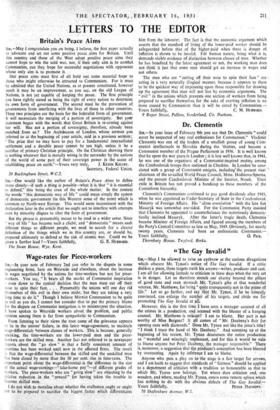Wage-rates for Piece-workers
SIR,—In your note of February 2nd you refer to the dispute in some engineering firms, here on Wcarside and elsewhere, about the increase in wages negotiated by the unions for time-workers but not for piece- workers. You say, "It bears all the marks of Communist inspiration - even down to the cynical decision that the men must .cut off their nose to spite their face. . . . Presumably the unions will one day rid themselves of this evil in their own midst, but they are taking a very long time to do it." Though I believe Marxist Communism to be quite as evil as you do, I cannot but consider that to put the primary blame for the dispute on Communist instigation is to misinterpret the situation. I have spoken to Wearside workers about the problem, and public opinion among them is far from sympathetic to Communism.
From listening to their views the root cause of the grievance appears to lie in the unions' failure, in this latest wage-agreement, to maintain wage-differential: between classes of workers. This is because, generally speaking, the time-workers are the lower-paid men and the piece- workers are the skilled men. Another fact not referred to in newspaper reports about the "go slow" is that a fairly consistent amount of overtime has been worked until now in the affected firms. The result i, that the wage-differential between the skilled and the unskilled man has been closed by more than the 10 per cent, rise in time-rates. The Important point about the wage-differentia1 is the difference in the size of the actual wage-earnings--" take-home pay "—of different grades of Workers. The piece-workers who are "going slow" arc objecting to the relative reduction in the "reward" for having taken the trouble to become skilled men.
I do not wish to moralise about whether the craftsman _ought or ought not to be prepared to sacrifice the biggest factor which differentiatet him from the labourer. The fact is that the economic argument which asserts that the standard of living of the lower-paid worker should be safeguarded before that of the higher-paid when there is danger of inflation is shown to be invalid. FOr human nature, being what it is, demands visible evidence of distinction between classes of men. Whether he has benefited by the latest agreement or not, the working man does not think it just that some men should get an increase in wages and not others.
The men who are "cutting off their nose to spite their face" are acting in a very naturally illogical manner, because it appears to them to be the quickest way of impressing upon those responsible for drawing up the agreement that man will not live by economic arguments. The "evil" in the unions which prevents one section of workers from being prepared to sacrifice themselves for the sake of averting inflation is no more caused by Communism than it will be cured by Communism.—


































 Previous page
Previous page